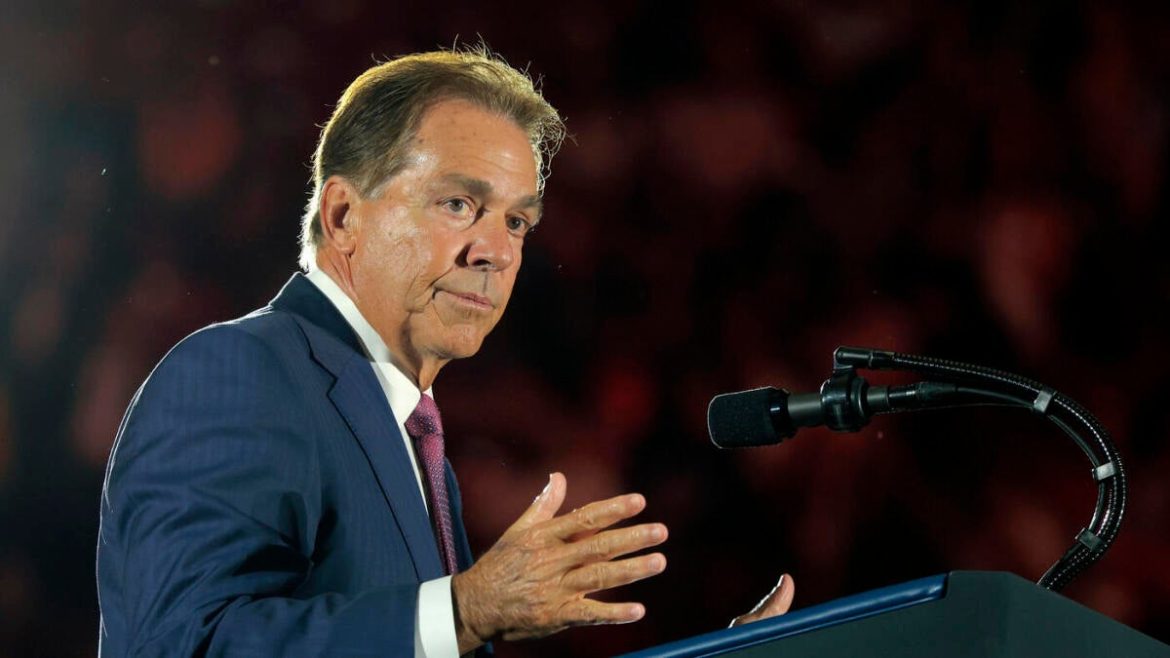The Future of College Football Playoff: Nick Saban’s Role and the Expansion Debate
The landscape of college football is poised for transformative change, with discussions intensifying around expanding the College Football Playoff (CFP) format. Central to this evolving narrative is Nick Saban, the celebrated Alabama coach, whose growing involvement and shifting stance on playoff expansion could reshape the sport’s governance and postseason structure.
Nick Saban’s Influential Position in College Football Governance
Nick Saban’s ambitions extend beyond the sidelines as he gains considerable backing for a potential role as commissioner of college football. This development signals a significant shift in college football governance, with Saban’s reputation and influence potentially redefining decision-making at the highest levels. Supported by prominent figures within the sport, Saban’s commissioner bid aligns him closely with the ongoing debates over playoff expansion and conference dynamics.
The Expansion of the College Football Playoff: From 4 to 12 and Beyond
Originally featuring a four-team playoff, the CFP expanded to 12 teams beginning with the 2024 season. This expansion aimed to enhance competitive balance and generate greater revenue streams, particularly benefiting powerhouse conferences like the SEC and Big Ten. Now, discussions focus on expanding the playoff field even further — to 14 or 16 teams — with leaders from the SEC and Big Ten pushing for a larger format that includes multiple automatic bids for their conferences.
Key Proposals and Conference Dynamics
A prominent proposal gaining traction involves granting four automatic bids apiece to the SEC and Big Ten, two each to the ACC and Big 12, and one to the Group of Five conferences. Such an arrangement would drastically increase these power conferences’ guaranteed presence in the postseason, raising concerns about competitive fairness for smaller conferences.
The recent 12-team format already guaranteed top-four seeds to ACC and Big 12 champions. However, moving to 16 teams with built-in automatic qualifiers would likely deepen the influence of the SEC and Big Ten, potentially diminishing the opportunity for underdog teams and smaller leagues to participate.
Nick Saban’s Evolving Opinion on Playoff Expansion
Initially cautious, Nick Saban has shifted his stance toward endorsing further playoff expansion. He’s publicly supported expanding the CFP to 16 teams amid ongoing talks, particularly as SEC and Big Ten leaders advocate for guaranteed bids for their conferences. Despite this endorsement, Saban has also expressed reservations, particularly regarding the impact on traditional bowl games and the overall structure of the college football postseason.
Saban has emphasized the complexity of balancing growth with tradition and the need for a playoff system that serves the best interests of the sport as a whole. His nuanced approach reflects the broader tensions in college football between maximizing revenue and maintaining competitive integrity.
Implications of Playoff Expansion on College Football
Financial and Competitive Consequences
The expansion to 12 teams already significantly boosted payouts, with evidence showing that conferences like the SEC have benefited substantially in terms of revenue distribution. Additional expansion to 16 teams is projected to further enrich major conferences, especially those with multiple guaranteed bids. This financial incentive fuels the lobbying efforts by the SEC and Big Ten for expanded automatic qualifiers.
However, critics argue that such expansion risks devaluing the regular season, as more teams gain entry into the postseason, potentially diluting the stakes of conference championships and regular-season matchups. There is concern that the traditional excitement and narrative of “win or go home” may be eroded.
Governance and Power Struggles
The push for expansion has ignited political contention among college football stakeholders. The SEC and Big Ten’s proposal for multiple automatic bids has drawn pushback from other conferences and media outlets, indicating a power struggle that could invite federal scrutiny of the playoff selection process. Saban’s potential commissioner role places him at the nexus of these debates, with his leadership likely to influence the direction and resolution of these conflicts.
Potential Changes to Scheduling and Season Structure
Discussions include not only increasing playoff field size but also modifying regular-season schedules, such as potentially adopting a nine-game conference schedule to accommodate more postseason games. These changes would directly affect players, fans, and tradition, illustrating the broad impact playoff expansion decisions have on the college football ecosystem.
Conclusion: A New Era of College Football Playoff Looms
The expansion of the College Football Playoff is no longer a distant prospect but an impending reality driven by influential voices like Nick Saban and the powerful conferences of the SEC and Big Ten. While the move toward a 14- or 16-team format promises to redefine postseason competition and revenue allocation, it also raises challenging questions about competitive balance, tradition, and governance.
Nick Saban’s growing involvement as a potential commissioner and advocate for expansion places him at the forefront of these debates, embodying the complex interplay between preserving college football’s heritage and embracing its commercial evolution. As negotiations continue, the decisions made in the next few years will likely set the tone for college football’s future — a future where power, politics, and passion collide on the road to a more expansive playoff and potentially a new era of the sport.





